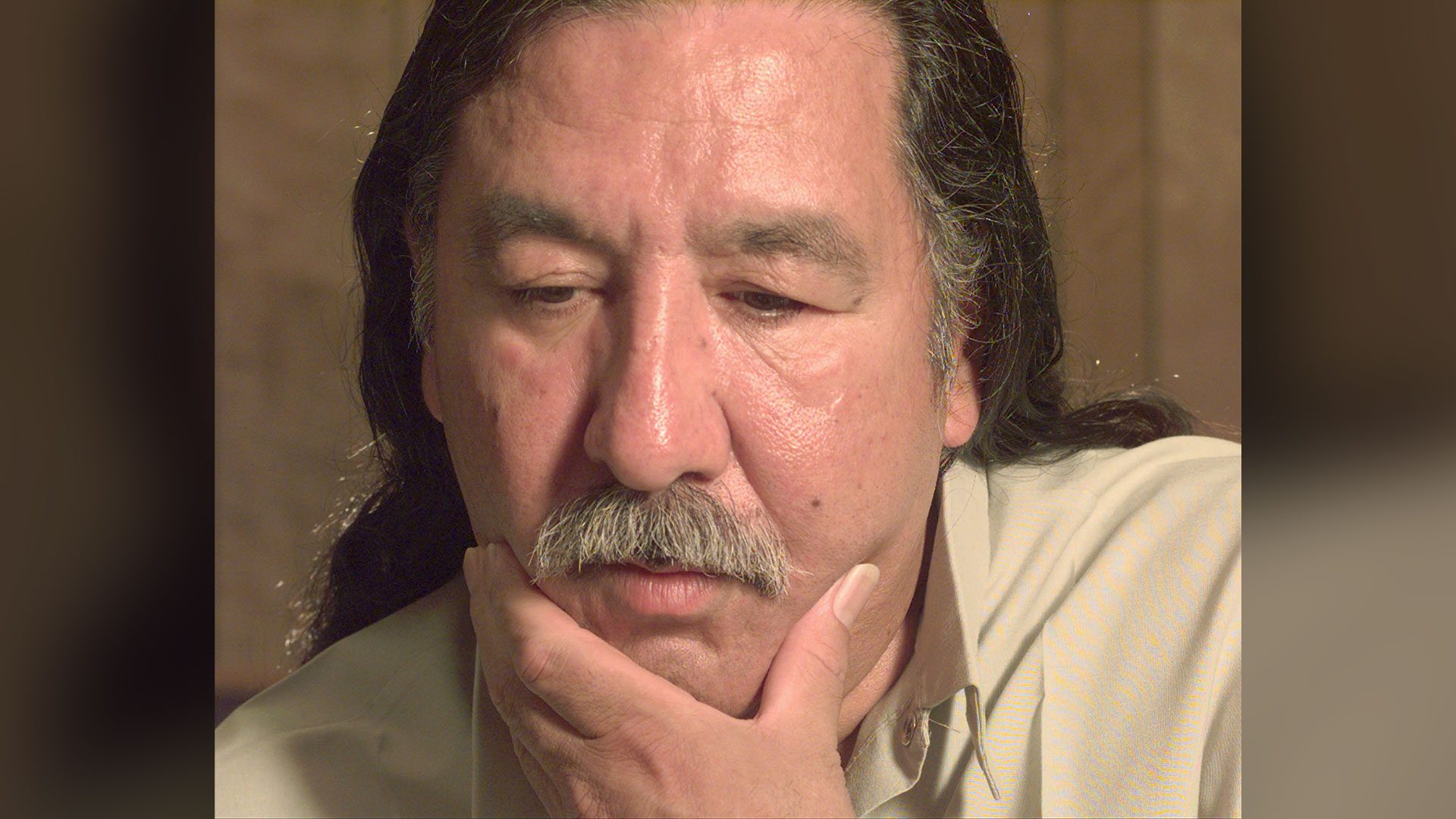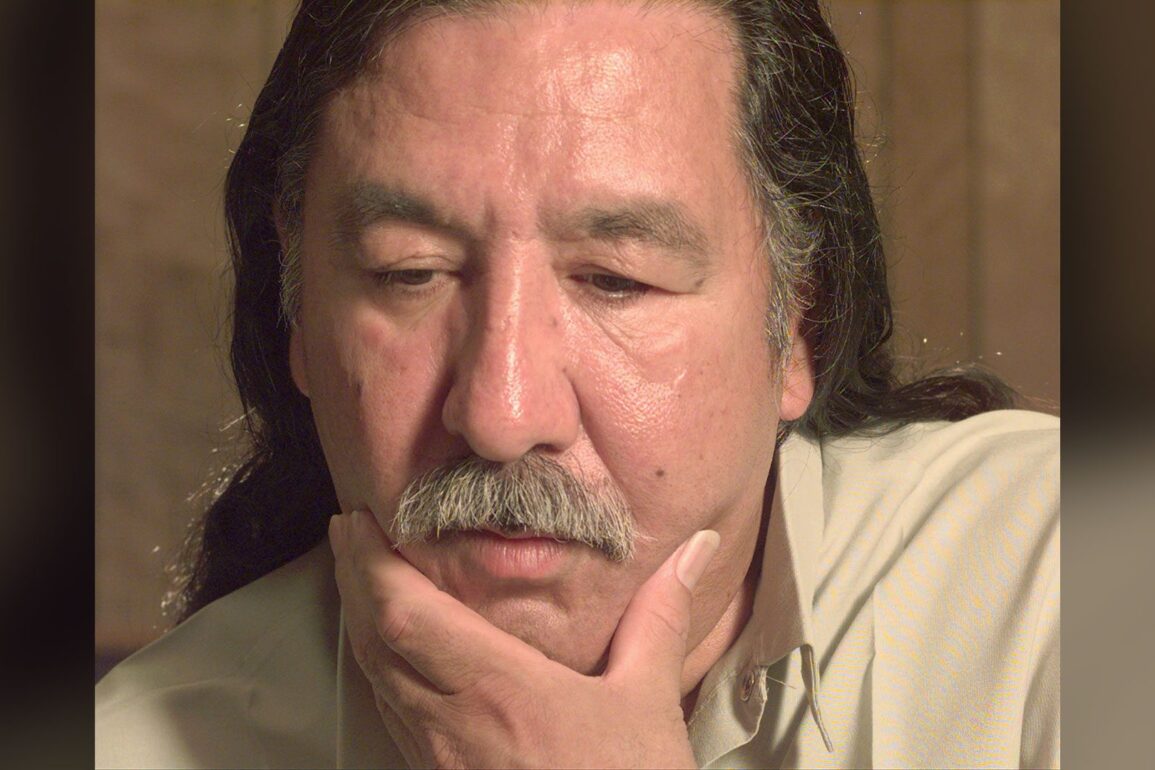The room that hosts parole board hearings in Florida’s Coleman 1 prison is small, cramped, hot and uncomfortable, says Kevin Sharp, Leonard Peltier’s lawyer.
“The table takes up so much space in the room that when the parole board panel, lawyers, witnesses and inmate pull out their chairs to sit down the chairs touch the wall,” he said.
In an interview with APTN News, Sharp said this is the room where Peltier had his first parole hearing in more than a decade – and possibly his last shot at seeing the outside world again.
Coleman 1 is a high-security USP or United States Penitentiary, located smack in the middle of Florida about an hour’s drive northwest of Orlando.
Sharp shared what he could about the parole hearing in a phone interview.
“What parole boards look at is things like, is someone still a danger; can we put them back out into society; do we need to worry about recidivism?
“Leonard is an 80-year-old guy. He is not going to re-offend. He just wants to go home and paint and hug his family. He is not out protesting or doing anything else, he’s dependent on a walker. He just wants to see his kids,” said Sharp.
Sharp said Peltier had family members at the hearing, the FBI had a victim’s rights coordinator and a representative from the bureau plus an official from the U.S. Attorney’s Office.
“We had witnesses to discuss Leonard’s life after release, including his housing and healthcare on the Turtle Mountain Band of Chippewa reservation,” he said.
Sharp points out how the parole hearing seemed unbalanced.
“The legal system called seven witnesses, we were only allowed one, which we (lawyers for Peltier), went back and argued to have one more added. We got our one more, but it was a witness they, (U.S. Attorney’s Office) chose, not us,” he said.
“It seemed to go well but it’s hard to say. The most we can hope for is the people in the room listen and are receptive to the testimony. I think that was the case but, again, it’s hard to tell.”
The parole board has 21 days from the day of the hearing to make their decision. A decision should be made by July 1.
A brief background on the case and Peltier’s health

Peltier is serving two consecutive life sentences after being convicted of the killing of two FBI agents, Jack Coler and Ronald Williams, on June 26, 1975, at the Jumping Bull Ranch in South Dakota.
He has been behind bars for 47 years.
Peltier was the only one out of three American Indian Movement, or AIM, members charged in the murders of the two agents who was not acquitted of the charges.
Two other AIM members who were present, Robert Robideau and Dino Butler, were both acquitted following a trial in Cedar Rapids, Iowa.
Peltier was tried in Fargo, North Dakota, and found guilty of both murders.
“He’s 79 now, so he has all the health issues that come along with a normal 79-year-old, plus additional health issues that have been compounded by lack of care and services,” said Sharp.
“He has an abdominal aortic aneurysm, which is deadly if it ruptures. It’s bad. It has to be monitored closely, and it hasn’t been as closely monitored as it should have been.”
Sharp goes on to explain that the location of the jail makes an emergency even more complicated.
“Coleman can’t handle that type of medical procedure, should something happen with the aneurism. Coleman is about an hour away from Orlando, it’s also about an hour to Tampa. Coleman is in the middle of nowhere.”
Sharp is also concerned about diet and exercise which Peltier has little control over.
“He has heart issues and diabetes, which is not abnormal at his age but are exacerbated by lack of proper monitoring and care,” he said.
Adding how the poor dietary options are making things worse, Sharp added, “How can one manage diabetes on a diet of bologna and peanut butter?”
According to Sharp, most of Peltier’s time is spent in lockdown as “maximum security prisons are violent places.” He adds the prison is ”woefully understaffed.”
“When staffing levels drop the prisoners go into lockdown,” said Sharp.
Sharp told APTN, Peltier’s physical condition is rapidly deteriorating.
“The last few times I’ve seen him, he’s used a walker. He’s been blind in one eye, left partially blind from a stroke he had years ago, and his eyesight has gotten worse and he hasn’t had access to a dentist in years and has very few teeth left which is another challenge with the diabetes.”
On June 10, Peltier had his first parole hearing in 15 years.
“If they deny him parole this time, I don’t know that he makes it to the next one,” said Sharp. “He’s in Coleman 1, a maximum-security prison, which is dangerous for a frail, in-poor-health, 80-year-old man.”
Sharp also spoke about Peltier’s mental health
“He knows he is at the end of his life and he would just love some time with his children, grandchildren and great grandchildren before the end.”
Typically, parole boards want an admission of guilt and remorse.
Peltier has maintained his innocence.
“It’s difficult because Leonard didn’t commit the crime and there’s no evidence that he did. He shouldn’t lie about something he didn’t do,” said Sharp. “Leonard has expressed remorse for the tragic events of that day and the overall situation. Leonard feels bad about everything that happened.
“It’s important for the hearing officer to understand this context and Leonard’s genuine feelings of remorse for the tragedy.”
There have long been concerns about the state’s trial against Peltier.
Amnesty International published an article on March 10, 2016 that outlined one of the concerns that a key witness was coerced into testifying against Peltier in his trial.
“Allegations have arisen that a key eyewitness was coerced into testifying against Leonard Peltier by months of FBI harassment and threats. She later retracted her testimony, but was not allowed to be called as a defence witness at his trial,” Amnesty’s report said.
“There are further concerns about the evidence linking Leonard Peltier to the shootings as well as the prosecution’s withholding of evidence that might have assisted Leonard Peltier’s defence. Parole examiners have thus far failed to take mitigating factors into account.”
In a letter sent to the parole commission from Amnesty International’s executive director, Paul O’Brien expressed his concern about the legal process that led to Peltier’s conviction stressed Peltier’s age, time served, and his health issues, urging the commission to grant him parole.
“Given the ongoing, unresolved concerns about the fairness of Leonard Peltier’s incarceration, that he has spent nearly 50 years in prison, his age, and ongoing and chronic health issues, granting parole on humanitarian grounds in this case is not only timely but a necessary measure in the interests of both justice and mercy,” said O’Brien in the letter.
Sharp has represented Peltier since 2019 including efforts to secure a presidential clemency for him.
According the U.S. Constitution in the United States, presidents have the power “to grant Reprieves and Pardons,” or clemency to those who committed crimes against the United States.
Sharp said his legal team has filed for clemency twice, under former president George Bush Jr., and under Barack Obama.
Both attempts were unsuccessful.
APTN reached out to the Florida Parole Board for comment but didn’t hear back by the deadline.
We also reached out to several members of Peltier’s family for comment but didn’t get a response.
This post was originally published on this site be sure to check out more of their content.









